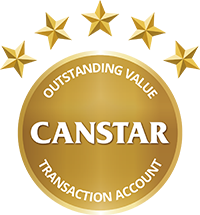Compare Transaction Accounts
If you’re looking for a transaction account, you can learn more about them with Canstar. Peruse the winners of our Transaction Account Awards to find one that may be suitable for you.
What is a transaction account?
A transaction account is an everyday bank account that is used for your day-to-day banking. It typically comes with a linked debit card for your everyday spending. Most people get their pay deposited straight into their transaction account and also use this account to pay bills and make transfers.
Transaction accounts can come with a range of features and benefits, such as:
- a debit card with Visa PayWave or Mastercard PayPass for contactless payments
- mobile payments, such as Apple Pay, Google Pay and Samsung Pay
- ATM access in Australia and internationally
- the ability to send and receive money via a range of payment methods, such as Pay Anyone, Osko, PayID and BPAY
- mobile and internet banking so you can access your money 24/7.
How do Canstar’s Transaction Account Awards work?
Canstar considers over 100 transaction accounts from different banks and financial institutions. Our expert researchers use a sophisticated methodology to rank accounts based on their fees and features. We give the top performing accounts a 5-Star Rating.
When comparing transaction accounts, here are some factors to look out for.
Account-keeping fees
Some banks charge a monthly account-keeping fee, which can add up over time. It’s best to look for a transaction account with no monthly fee, or one where you can get the fees waived. Many banks waive the monthly fee if you meet certain conditions (such as making a minimum monthly deposit or being a student or pensioner). If you will pay a fee, check whether the features justify the cost.
Other fees
Depending on your banking habits and the account you choose, you may be charged other fees like international currency conversion fees, ATM fees, EFTPOS transaction fees and overdraft fees. Think about your spending habits. For instance, if you regularly travel or make overseas purchases online, look for an account that has low or no currency conversion fees.
Features
Think about how easy it is to use your account day-to-day. For instance, can you make contactless or mobile purchases? Does the provider’s mobile or internet banking service let you easily make transfers, pay bills and see your spending history? Are there any budgeting tools available? What security features are on offer?
About our finance experts
Nina Rinella, Editor-in-Chief
As Canstar’s Editor-in-Chief, Nina heads up a team of talented journalists committed to helping empower consumers to take greater control of their finances. Previously Nina founded her own agency where she provided content and communications support to clients around Australia for eight years. She also spent four years as the PR Manager for American Express Australia, and has worked at a Brisbane communications agency where she supported dozens of clients, including Sunsuper and Suncorp.
Nina has ghostwritten dozens of opinion pieces for publications including The Australian and has been interviewed on finance topics by the Herald Sun and the Sydney Morning Herald. When she’s not dreaming up ways to put a fresh spin on finance, she’s taking her own advice by trying to pay her house off as quickly as possible and raising two money-savvy kids.
Nina has a Bachelor of Journalism and a Bachelor of Arts with a double major in English Literature from the University of Queensland. She’s also an experienced presenter, and has hosted numerous events and YouTube series.
You can follow her on Instagram or X, or Canstar on Facebook.
You can also read more about Canstar’s editorial team and our robust fact-checking process.
Josh Sale, Transaction Account Ratings Manager
 As Canstar’s Ratings Manager, Josh Sale is responsible for the methodology and delivery of Canstar’s Transaction Account Star Ratings and Awards. With tertiary qualifications in economics and finance, Josh has worked behind the scenes for the last five years to develop Star Ratings and Awards that help connect consumers with the right everyday account for them.
As Canstar’s Ratings Manager, Josh Sale is responsible for the methodology and delivery of Canstar’s Transaction Account Star Ratings and Awards. With tertiary qualifications in economics and finance, Josh has worked behind the scenes for the last five years to develop Star Ratings and Awards that help connect consumers with the right everyday account for them.
Josh is passionate about helping consumers get hands-on with their finances. Josh has been interviewed by media outlets such as the Australian Financial Review, news.com.au and Money Magazine.
You can follow Josh on LinkedIn, and Canstar on X and Facebook.
Important information
For those that love the detail
This advice is general and has not taken into account your objectives, financial situation or needs. Consider whether this advice is right for you.
























